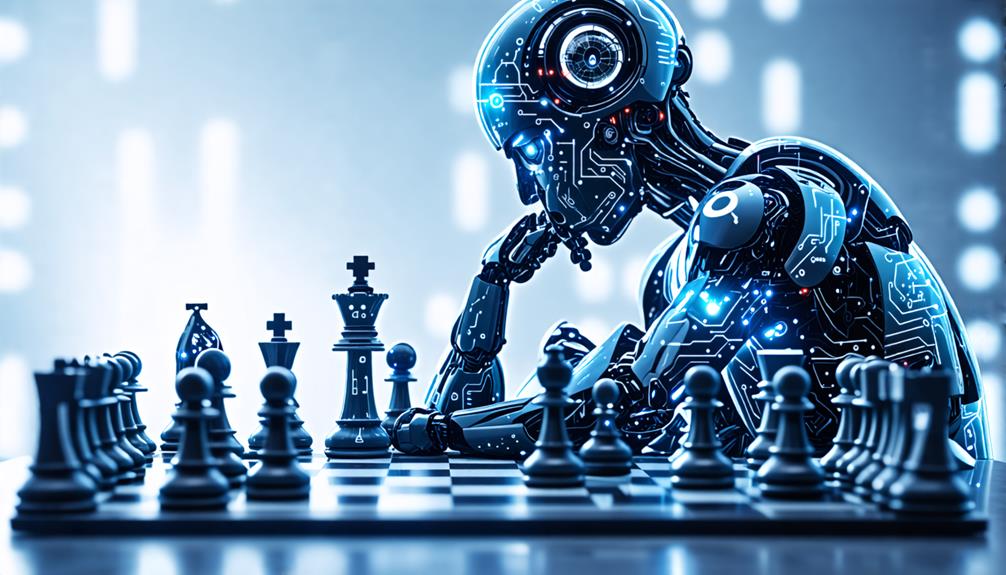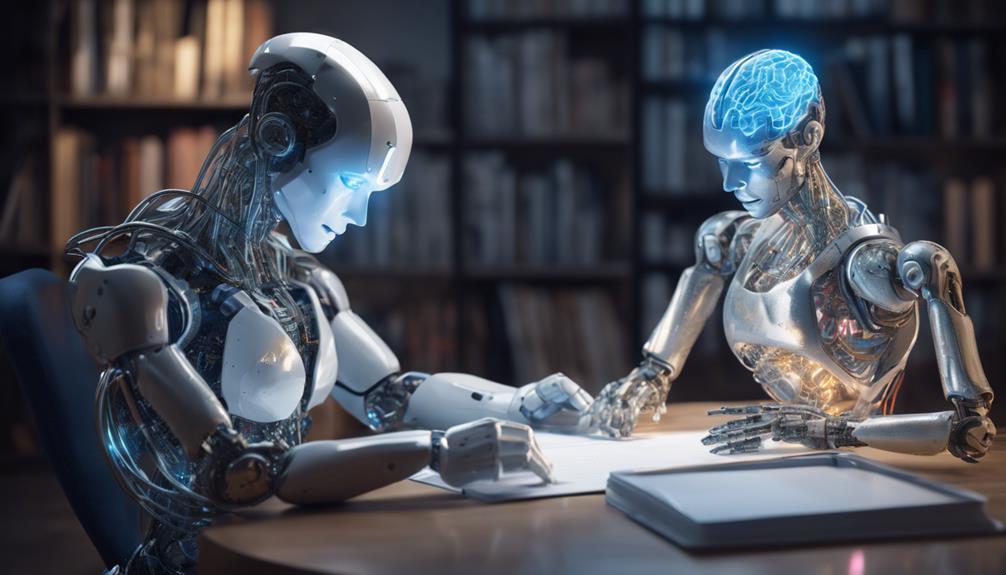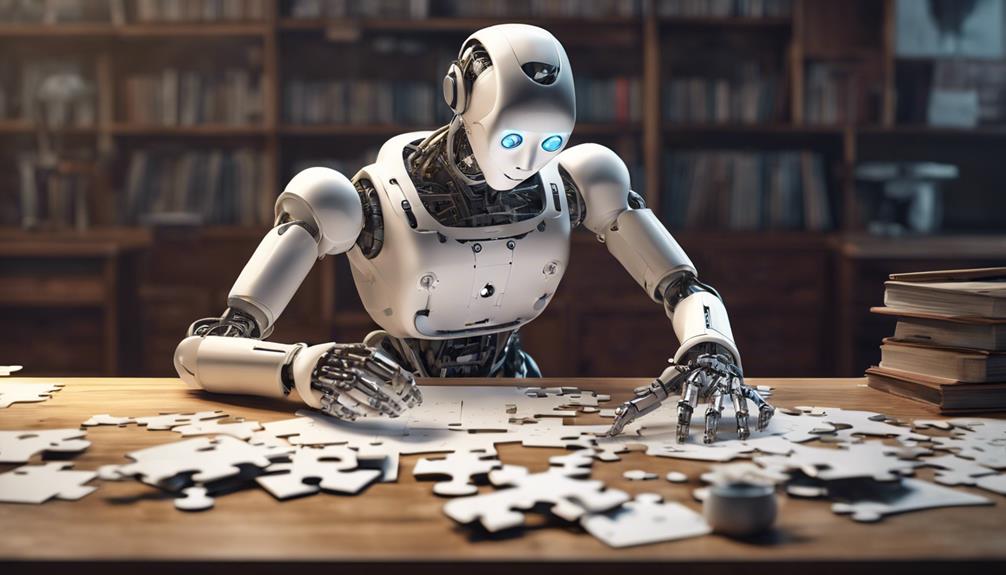
You might find it surprising, but artificial intelligence doesn't have an IQ in the traditional sense used to measure human intelligence. Instead, AI's intelligence focuses on tasks like problem-solving, pattern recognition, and data analysis, excelling in speed and accuracy. The measures of AI intelligence, such as the Turing Test and Winograd Schema Challenge, are specifically designed to assess its problem-solving and learning capabilities. Remember, though AI lacks human-like cognitive flexibility and emotional reasoning, its evolving capabilities continue to redefine its role in various industries. Exploring further will uncover how AI intelligence is both impressive and continuously developing.
Defining Intelligence in AI

Defining intelligence in AI involves understanding how machines mimic cognitive functions you associate with human minds, such as learning and problem-solving. It's about recognizing that these systems are designed to perceive their environments, interpret external data, and make decisions based on that information to achieve specific goals.
You'll find AI intelligence spans a broad spectrum, from simple algorithms that execute straightforward tasks to sophisticated systems capable of handling complex computations and human-like reasoning. These machines don't just follow instructions; they adapt based on their experiences. This adaptability is key to what you might consider 'intelligent' behavior in AI.
When you interact with AI, you're engaging with systems that learn from data. They recognize patterns, make predictions, and improve over time. Unlike human intelligence, which is influenced by emotions, social contexts, and biological factors, AI's intelligence is purely functional, aimed at efficiency and accuracy.
Understanding AI's intelligence isn't just about how smart the system appears but also how effectively it can integrate and evolve within various applications. It's about appreciating how these technologies can extend beyond programmed capabilities and begin to interact with the world in ways previously thought exclusive to humans.
Measuring AI IQ
To measure the IQ of AI, you need specific benchmarks that assess various aspects of machine intelligence, such as problem-solving, learning efficiency, and adaptability. These benchmarks aren't your standard IQ tests designed for humans; they're tailored to evaluate the unique capacities of AI systems.
You'll find that tests like the Turing Test and its more evolved forms, such as the Winograd Schema Challenge, are commonly used. These tests don't just gauge if an AI can mimic human behavior but also if it can engage in nuanced conversations and make decisions based on context, which involves a deeper level of understanding and responsiveness.
Moreover, specialized tasks that measure how well an AI system can learn from data and improve over time are crucial. These include reinforcement learning environments where AI must navigate complex scenarios, learning how to optimize its actions based on feedback. Tasks that test AI's ability to solve puzzles and recognize patterns are also integral. These help in determining an AI's ability to handle tasks that require both creative and logical thinking.
Ultimately, the tests you use should align with what aspects of intelligence you're most interested in exploring. This approach provides a more comprehensive understanding of an AI's intellectual capabilities.
Challenges in AI IQ Testing

While measuring AI IQ with specialized tests is insightful, it also presents unique challenges. You're dealing with entities that don't process information or solve problems like humans. AIs lack intuition and emotional reasoning, which can skew results significantly. They excel in tasks requiring speed and accuracy but struggle with abstract and creative thinking, aspects often included in traditional IQ tests.
Another hurdle you'll face is the adaptability of tests. Most IQ assessments are designed for human cognition, focusing on linguistic, spatial, and logical reasoning. Adapting these tests for AI often means oversimplifying them, which mightn't accurately measure an AI's advanced computational abilities.
Additionally, there's the issue of fairness and bias. AIs are trained on datasets that mightn't be representative of the diverse types of intelligence across different systems and architectures. This can lead to biased outcomes favoring certain algorithms over others, not truly reflecting an AI's general intelligence.
Lastly, consider the rapid evolution of AI. The technology advances so quickly that by the time you've developed a standardized test, it might already be outdated. This makes consistent measurement over time a formidable challenge. You're essentially trying to hit a moving target with a tool that wasn't originally designed for it.
Human Vs. Machine Intelligence
Comparing human and machine intelligence reveals profound differences in how each processes and applies information. You'll find that humans excel in cognitive flexibility and emotional intelligence. This enables you to handle complex social interactions and adapt to new and unexpected situations with creativity that machines can't yet replicate.
On the other hand, machines process vast quantities of data at speeds and accuracies that are unattainable for humans. They're designed to perform specific tasks, such as calculating complex equations or identifying patterns in data, with a precision and consistency that surpass human capabilities. However, they lack the ability to truly understand or feel the data they process.
While you can grasp nuances and context, AI typically struggles with anything that isn't explicitly programmed into it. Your intelligence is dynamic, capable of learning and adapting in ways that are deeply human—through experiences, sensations, and emotions. Machines, while increasingly sophisticated, still operate within a set framework defined by their algorithms and the data they're trained on.
Keep in mind, the way you and machines learn is fundamentally different. You learn from diverse experiences, while machines require vast amounts of data and specific instructions to improve.
Implications of AI IQ Scores

Assessing AI's IQ scores reveals significant implications for both technology and society.
You've likely heard debates about whether machines can truly think or just simulate thought. These scores provide a quantitative basis to that discussion, highlighting areas where AI excels or struggles compared to human intelligence.
For you, this means a shift in job landscapes. Tasks that AI can perform efficiently mightn't require human intervention anymore, pushing you to adapt or refine your skill set to stay relevant.
Additionally, this evolution in AI capabilities could lead to innovations in industries like healthcare, where AI's data processing superiority can enhance diagnostic accuracy.
However, it's not all progress and productivity. You should also consider the ethical dimensions introduced by intelligent machines. As AI starts performing complex tasks, the line between tool and entity could blur, raising questions about rights, responsibilities, and moral status.
How society answers these will shape your interactions with and regulations around AI technologies.
Moreover, as you interact more with AI, whether at work or through personal devices, understanding its intellectual boundaries helps set realistic expectations and safeguards. Knowing what AI can and can't understand influences how you integrate these tools into your daily life, ensuring they augment rather than disrupt.
Future of AI Cognition
Exploring the future of AI cognition, you'll see how ongoing advancements could further redefine human-machine interactions. As AI systems gain deeper learning capabilities and more sophisticated pattern recognition, they're not just processing information; they're starting to understand context and nuance in ways that mimic human thought. You might find AI becoming an integral tool in fields where cognitive flexibility and decision-making are crucial, such as medicine, law, and finance.
Imagine AI systems that don't just recommend treatments based on data but can consider ethical implications and patient preferences, bringing a nuanced approach to healthcare. In finance, AI could navigate market complexities with a level of precision and foresight unattainable by humans alone.
The potential for AI to work alongside humans in creative processes or strategic planning is also on the horizon. They could offer new perspectives derived from analyzing vast datasets that no human could feasibly comprehend.
However, with these advancements, you'll also need to navigate the ethical terrain that comes with increasingly autonomous AI systems. Ensuring transparency in AI decisions, preventing biases in AI algorithms, and maintaining human oversight will be crucial as these technologies become more embedded in everyday life.
Frequently Asked Questions
Can AI IQ Scores Predict Their Performance in Real-World Scenarios?
AI IQ scores can't fully predict their real-world performance because they don't capture all aspects of practical intelligence, like emotional understanding and adaptability, which are crucial for success in dynamic environments.
How Does AI IQ Impact Ethical Decision-Making?
You're asking how AI's intelligence affects ethical choices. Higher IQ doesn't guarantee ethical decisions; it's more about programming and the values instilled by developers rather than the AI's inherent intelligence level.
Will AI Ever Develop Emotional Intelligence Like Humans?
You're curious if AI will ever develop emotional intelligence similar to humans. While AI can mimic certain emotional responses, truly experiencing emotions like humans do remains a significant and unresolved challenge.
What Roles Can High IQ AI Play in Education Sectors?
High IQ AI can revolutionize education by personalizing learning, streamlining administration, and providing real-time assistance to students and teachers, enhancing efficiency in classrooms and enabling more focused, individualized educational experiences.
Are There Legal Implications for AI With High IQ Scores?
You're asking about legal concerns for intelligent AI. Yes, there are implications, especially in accountability and privacy. Laws may need updating to address AI's role and responsibilities in decision-making processes.
Conclusion
You've delved into how we measure AI intelligence, exploring both the methods and challenges. Remember, comparing human intelligence to that of AI isn't straightforward—AI operates differently.
The IQ scores you see for AI might impress, but they don't capture everything about how machines think and learn. As technology advances, AI cognition will continue to evolve, reshaping what intelligence means in a digital age.
Keep an eye on this space; the future is unfolding right before us.






